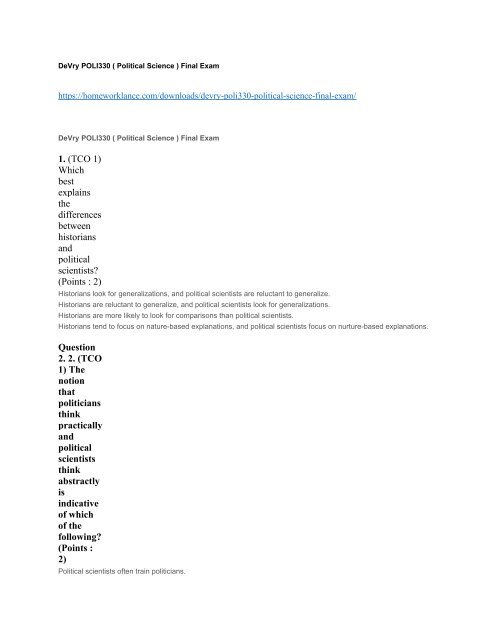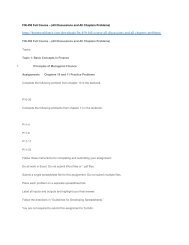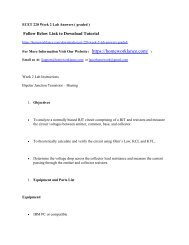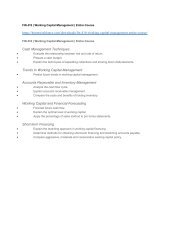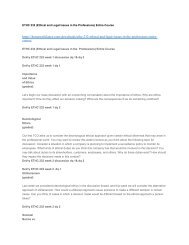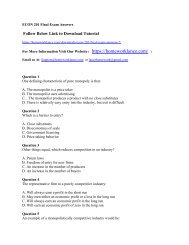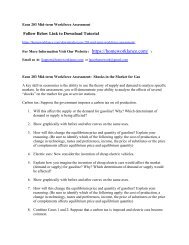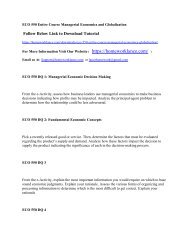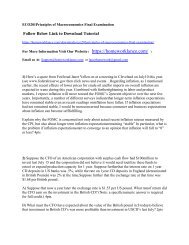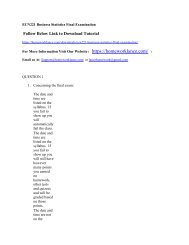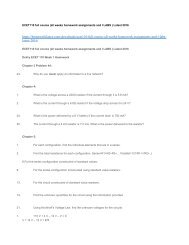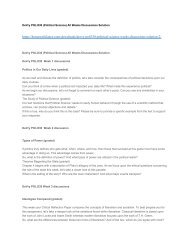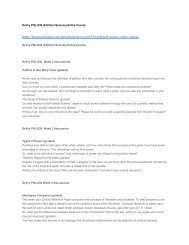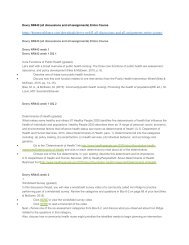DeVry POLI330 ( Political Science ) Final Exam
Create successful ePaper yourself
Turn your PDF publications into a flip-book with our unique Google optimized e-Paper software.
<strong>DeVry</strong> <strong>POLI330</strong> ( <strong>Political</strong> <strong>Science</strong> ) <strong>Final</strong> <strong>Exam</strong><br />
https://homeworklance.com/downloads/devry-poli330-political-science-final-exam/<br />
<strong>DeVry</strong> <strong>POLI330</strong> ( <strong>Political</strong> <strong>Science</strong> ) <strong>Final</strong> <strong>Exam</strong><br />
1. (TCO 1)<br />
Which<br />
best<br />
explains<br />
the<br />
differences<br />
between<br />
historians<br />
and<br />
political<br />
scientists?<br />
(Points : 2)<br />
Historians look for generalizations, and political scientists are reluctant to generalize.<br />
Historians are reluctant to generalize, and political scientists look for generalizations.<br />
Historians are more likely to look for comparisons than political scientists.<br />
Historians tend to focus on nature-based explanations, and political scientists focus on nurture-based explanations.<br />
Question<br />
2. 2. (TCO<br />
1) The<br />
notion<br />
that<br />
politicians<br />
think<br />
practically<br />
and<br />
political<br />
scientists<br />
think<br />
abstractly<br />
is<br />
indicative<br />
of which<br />
of the<br />
following?<br />
(Points :<br />
2)<br />
<strong>Political</strong> scientists often train politicians.
Politicians often train political scientists.<br />
<strong>Political</strong> scientists and politicians are different in that the former studies the latter.<br />
<strong>Political</strong> scientists and politicians are often indistinguishable.<br />
Question<br />
3. 3.<br />
(TCO 1)<br />
When<br />
people<br />
base<br />
their<br />
views on<br />
beliefs<br />
that may<br />
not be<br />
based in<br />
reality,<br />
they are<br />
behaving<br />
_____.<br />
(Points :<br />
2)<br />
irrationally<br />
rationally<br />
politically<br />
legitimately<br />
Question<br />
4. 4.<br />
(TCO 1)<br />
A<br />
political<br />
leader’s<br />
ability to<br />
command<br />
respect<br />
and<br />
exercise<br />
power is<br />
known as<br />
_____.<br />
(Points :<br />
2)<br />
sovereignty<br />
corruption<br />
authority<br />
legitimacy
Question 5.<br />
5. (TCO 1)<br />
Despite a<br />
disputed<br />
2000<br />
presidential<br />
election,<br />
once<br />
President<br />
George W.<br />
Bush took<br />
office, few<br />
people<br />
doubted his<br />
_____.<br />
(Points : 2)<br />
charisma<br />
control<br />
legitimacy<br />
sovereignty<br />
Question<br />
6. 6.<br />
(TCO 1)<br />
Relating<br />
concepts<br />
in a way<br />
that<br />
connects<br />
them in<br />
an<br />
empirical<br />
manner<br />
is the<br />
basis of<br />
_____<br />
building.<br />
(Points :<br />
2)<br />
scholarship<br />
theory<br />
power<br />
culture<br />
Question<br />
7. 7. (TCO
1) A(n)<br />
_____ is<br />
an initial<br />
theory a<br />
researcher<br />
starts with<br />
to be<br />
proved<br />
with<br />
evidence.<br />
(Points :<br />
2)<br />
quantification<br />
hypothesis<br />
qualification<br />
empirical<br />
Question<br />
8. 8.<br />
(TCO 4)<br />
Unlike<br />
natural<br />
law,<br />
positive<br />
law uses<br />
_____.<br />
(Points :<br />
2)<br />
the spirit of the law to make determinations<br />
books to reach conclusions<br />
judicial sentencing to determine case outcomes<br />
jury selection to manipulate judgment<br />
Question 9. 9.<br />
(TCO 4)<br />
Under which<br />
of the<br />
following<br />
circumstances<br />
might a case<br />
be pursued as<br />
both a<br />
criminal and<br />
a civil case?<br />
(Points : 2)<br />
The federal government accuses investment houses of wrongdoing and investors who lost money sue them.<br />
Drug traffickers violate property and federal law by moving drugs across state borders.
Burglars violate federal property and the state sues them for damages.<br />
A state accuses banks of mortgage fraud in mortgages sold to investors elsewhere in the nation.<br />
Question 10. 10.<br />
(TCO 4)<br />
Describe the<br />
significance<br />
of Marbury v.<br />
Madison. (Points<br />
: 2)<br />
The ruling laid precedent for judicial review.<br />
The ruling stated that the president is subject to the court’s decisions.<br />
The ruling decreed that current administrations must honor the appointments of previous administrations.<br />
The ruling claimed that federal taxes could not be levied on the states.<br />
Question<br />
11. 11.<br />
(TCO 4)<br />
What legal<br />
agency in<br />
the United<br />
States<br />
generates<br />
reputationbased<br />
ratings of<br />
prospective<br />
federal<br />
judges?<br />
(Points : 2)<br />
Judicial Ratings Bureau<br />
Federal Bureau of Judicial Review<br />
American Bar Association<br />
Office of Legal Assessment<br />
Question<br />
12. 12.<br />
(TCO 4)<br />
When<br />
was<br />
judicial<br />
review<br />
granted<br />
to the<br />
Supreme<br />
Court<br />
within
the<br />
United<br />
States?<br />
(Points :<br />
2)<br />
It was granted during the Constitution Convention of 1787.<br />
It was granted in the Bill of Rights.<br />
It was the result of the Marbury v. Madison decision of 1803.<br />
It was never officially adopted but is an unofficial practice.<br />
Question<br />
13. 13.<br />
(TCO 4)<br />
Which of<br />
the<br />
following<br />
best<br />
articulates<br />
the stance<br />
of judicial<br />
restraint<br />
advocates?<br />
(Points : 2)<br />
Judicial review is the best and only true method of checking legislative power.<br />
The court should practice restraint in cases in which legislative acts are presented for interpretation.<br />
Only the executive branch can restrain the court, keeping the power of judicial review in balance with the other<br />
governing branches.<br />
Only Congress should make public policy and, unless a legislative act clearly violates the Constitution, the law should<br />
stand.<br />
Question<br />
14. 14.<br />
(TCO 4)<br />
The<br />
Supreme<br />
Court’s<br />
decision<br />
in _____<br />
(1954)<br />
triggered<br />
a<br />
revolution<br />
in<br />
American<br />
race<br />
relations,
an area<br />
Congress<br />
had been<br />
unwilling<br />
to touch.<br />
(Points :<br />
2)<br />
Miranda v. Arizona<br />
Dred Scott v. Sandford<br />
Brown v. Board of Education<br />
Gibbons v. Ogden<br />
Question 15.<br />
15. (TCO 5)<br />
Which<br />
systems<br />
demonstrate<br />
the clearest<br />
separation<br />
of power<br />
between the<br />
executive<br />
and<br />
legislative<br />
branches?<br />
(Points : 2)<br />
Parliamentary<br />
Presidential<br />
Monarchies<br />
Ministerial<br />
Question 16.<br />
16. (TCO 5)<br />
How often<br />
does the<br />
cabinet<br />
change in a<br />
parliamentary<br />
system?<br />
(Points : 2)<br />
Every 4 years<br />
Every 6 years<br />
Every 8 years<br />
When the cabinet is voted out or resigns<br />
Question 17.<br />
17. (TCO 5)
Voters receive<br />
the most<br />
direct<br />
representation<br />
in which<br />
system?<br />
(Points : 2)<br />
Parliamentary<br />
Presidential<br />
Electoral<br />
Coalition<br />
Question<br />
18. 18.<br />
(TCO 5)<br />
The head<br />
of<br />
ministry<br />
is<br />
equivalent<br />
to the<br />
_____ in<br />
the United<br />
States.<br />
(Points :<br />
2)<br />
chief of government<br />
head of state<br />
departmental secretary<br />
premier<br />
1. (TCO 5)<br />
The only<br />
political<br />
system that<br />
could<br />
guarantee<br />
the<br />
cooperation<br />
between the<br />
legislative<br />
and<br />
executive<br />
branches is<br />
_____.<br />
(Points : 2)<br />
a monarchy<br />
a dictatorship
a democracy<br />
an oligarchy<br />
Question 3. 3.<br />
(TCO 5)<br />
Explain which<br />
type of<br />
candidate<br />
parliamentary<br />
systems seek<br />
out to become<br />
ministers.<br />
(Points : 2)<br />
Those who have experience winning elections and serving on a parliamentary committee<br />
Newcomers who can bring in a fresh perspective to the ministry<br />
Individuals who possess a great knowledge of the specific ministry’s area<br />
Those who have political experience regardless of whether or not they have been elected in the past<br />
Question<br />
7. 7.<br />
(TCO 7)<br />
Which of<br />
the<br />
following<br />
is an<br />
increasing<br />
financial<br />
concern<br />
of the<br />
Medicare<br />
program?<br />
(Points :<br />
2)<br />
The proportion of older people in American society is increasing steadily.<br />
Every American citizen on reaching 65 obtains Medicare, regardless of class.<br />
Economic inequality renders Medicare more necessary for some than for others.<br />
Wealthy Americans are taking advantage of the Medicare system.<br />
Question<br />
8. 8.
(TCO 7)<br />
Why are<br />
many<br />
politicians<br />
wary<br />
about<br />
limiting<br />
Social<br />
Security<br />
and<br />
Medicare<br />
expenses?<br />
(Points :<br />
2)<br />
Many would be left without enough to support them.<br />
Caps to these programs would undermine the welfare state.<br />
It can cost them votes.<br />
Both are primary social safety nets.<br />
Question 9. 9.<br />
(TCO 7) How<br />
does the<br />
American<br />
welfare state<br />
compare to<br />
those of other<br />
industrialized<br />
nations?<br />
(Points : 2)<br />
Much less is allocated to welfare in the United States.<br />
Other nations allocate less to welfare than the United States.<br />
The United States allocates about the same to welfare.<br />
Few nations besides the United States maintain funds for welfare.<br />
Question 10.<br />
10. (TCO 7)<br />
Theoretically,<br />
what are the<br />
consequences<br />
if the<br />
government<br />
assumes the<br />
burden of<br />
bad loans?<br />
(Points : 2)<br />
Citizens will default on their mortgages.
Banks will learn from their mistakes and pay back the burden with interest.<br />
Ultimately, the government will profit.<br />
Firms will be encouraged to continue their risky behavior.<br />
Question<br />
11. 11.<br />
(TCO 9)<br />
_____ is a<br />
small or<br />
moderate<br />
change<br />
that<br />
essentially<br />
leaves the<br />
system<br />
intact.<br />
(Points :<br />
2)<br />
Mass discontent<br />
Reform<br />
Dramatic system change<br />
A coup d’etat<br />
Question<br />
12. 12.<br />
(TCO 9)<br />
Describe<br />
what can<br />
often<br />
happen in<br />
a changing<br />
society<br />
when,<br />
during<br />
times of<br />
prosperity,<br />
some<br />
people get<br />
rich faster<br />
than<br />
others.<br />
(Points : 2)<br />
Jealousy is aroused.<br />
Politicians pay more attention to poverty.<br />
The very poor revolt.<br />
Economists become confused.
Question 13.<br />
13. (TCO 9)<br />
What is<br />
likely to<br />
happen if<br />
the people<br />
are unhappy<br />
and there is<br />
no<br />
organization<br />
to focus<br />
their<br />
discontent?<br />
(Points : 2)<br />
They will almost surely turn to violence.<br />
Not much will happen.<br />
The people will organize themselves, regardless.<br />
They will eventually find other means of achieving contentedness.<br />
Question<br />
14. 14.<br />
(TCO 9)<br />
What about<br />
U.S.<br />
agencies<br />
such as the<br />
Department<br />
of<br />
Homeland<br />
Security,<br />
the FBI,<br />
and the<br />
CIA make<br />
them so ill<br />
prepared to<br />
fight<br />
terrorism?<br />
(Points : 2)<br />
They have extremely different missions when it comes to terrorism.<br />
They are poorly funded.<br />
They have a great deal of red tape to get through in order to be able to communicate.<br />
They are often unwilling to communicate with each other.<br />
Question<br />
16. 16.
(TCO 9)<br />
Does<br />
terrorism<br />
work?<br />
(Points :<br />
2)<br />
Rarely, and seldom without political and/or economic pressure<br />
Rarely, but primarily when brought against democratic nations<br />
Often, and without much need for political pressure to aid it<br />
Often, but only with the assistance of economic and/or political pressure<br />
Question<br />
17. 17.<br />
(TCO 9)<br />
Hannah<br />
Arendt<br />
pointed<br />
out that<br />
rage is the<br />
fuel of<br />
revolution,<br />
but what<br />
is now the<br />
greatest<br />
cause of<br />
rage?<br />
(Points : 2)<br />
The low level of education in developing nations<br />
The enormous economic mismanagement in industrialized nations<br />
The extreme violence utilized by industrialized nations against developing nations<br />
The massive corruption now found in developing lands<br />
1. (TCO 2) Evaluate Aristotle’s six types of government. In doing so, please be sure to list and define the<br />
categorizations. Please then assess how these classifications can be useful today to someone analyzing current<br />
governmental structures. (Points : 40)<br />
Explain the relationship between electoral systems and party systems. Answers should be sure to assess this<br />
question from the perspective of both proportional representation and single-member districts and provide examples<br />
to support your points. (Points : 40)<br />
The United States has utilized multiple forms of liberalism throughout its history. Please distinguish the specific<br />
characteristics of classical and modern liberalism and outline the evolution of these forms of liberalism within the<br />
United States. Please be sure to include specific historic examples to support your points. (Points : 40)<br />
Today’s world seems to be moving beyond sovereignty and toward supranational leadership to cooperate on issues<br />
of global importance. What are some of these issues? How might they be solved through supranational cooperation?
Does such cooperation impede the sovereignty of independent nations? Please sure to include specific examples in<br />
supporting your points. (Points : 40)


